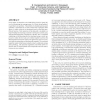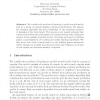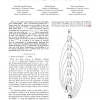1410 search results - page 64 / 282 » The Algorithmics of Solitaire-Like Games |
ICML
2005
IEEE
16 years 1 days ago
2005
IEEE
Learning algorithms often obtain relatively low average payoffs in repeated general-sum games between other learning agents due to a focus on myopic best-response and one-shot Nas...
125
click to vote
CODES
2003
IEEE
15 years 4 months ago
2003
IEEE
In this paper, we describe a new methodology based on game theory for minimizing the average power of a circuit during scheduling in behavioral synthesis. The problem of schedulin...
ALT
2008
Springer
15 years 8 months ago
2008
Springer
We consider the problem of learning to predict as well as the best in a group of experts making continuous predictions. We assume the learning algorithm has prior knowledge of the ...
COLT
1999
Springer
15 years 3 months ago
1999
Springer
We consider the problem of learning to predict as well as the best in a group of experts making continuous predictions. We assume the learning algorithm has prior knowledge of the ...
LICS
2009
IEEE
15 years 5 months ago
2009
IEEE
—We exhibit a deterministic concurrent reachability game PURGATORYn with n non-terminal positions and a binary choice for both players in every position so that any positional st...



